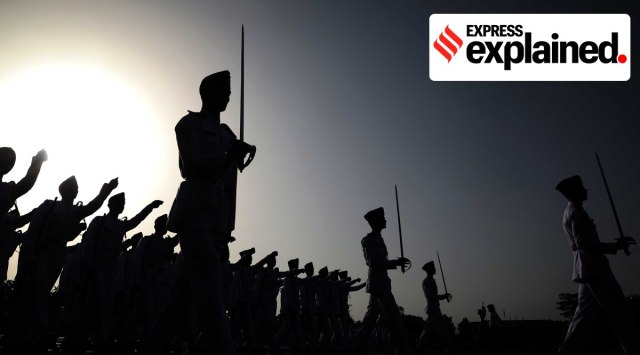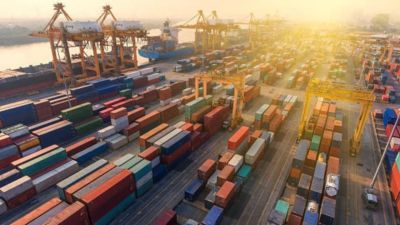India, Qatar and the continuing saga of eight detained ex-Indian Navy officers
The long custody of the veterans for reasons not yet in the public domain is a test for Indian diplomacy, and its engagement with the Indian diaspora.
 The jailing of eight ex-Navy personnel is a big challenge for India, writes Nirupama Subramanian. (Express Photo/File)
The jailing of eight ex-Navy personnel is a big challenge for India, writes Nirupama Subramanian. (Express Photo/File) Eight retired Indian Navy personnel who were arrested by Qatari authorities in August, will mark 127 days in imprisonment in Doha on Saturday (January 14). Each has been kept in solitary confinement for the whole period of four and a half months.
In response to a question on the efforts the government was making for their release, External Affairs Minister S Jaishankar told Parliament that their imprisonment was a “sensitive matter”. He said “their interests are foremost in our minds. Ambassadors and senior officials are in constant touch with the Qatar government. We assure, they are our priority”.
More than a month has passed since that statement on December 8. Earlier this month, a court in Doha extended their confinement by another month, as it has done at the beginning of every month since their arrest on August 30.
The long custody of the veterans for reasons not yet in the public domain is a test for Indian diplomacy, its engagement with the Indian diaspora, and considering that these men were in the Navy, the rules of the game for the re-employment of defence services personnel in other countries — a question that is bound to recur when the Agniveers take up careers outside the armed forces after their four-year contracts.
The eight men, and what they did in Qatar
The eight veterans — Captain Navtej Singh Gill, Captain Saurabh Vasisht, Commander Purenendu Tiwari, Captain Birendra Kumar Verma, Commander Sugunakar Pakala, Commander Sanjeev Gupta, Commander Amit Nagpal and Sailor Ragesh — were working at Dahra Global Technologies and Consultancy Services, a defence services provider company owned by an Omani national, a retired squadron leader of the Royal Omani Air Force. He too was arrested along with the eight Indians, but was released in November.
The website of the company, which no longer exists — it was removed after the first media report of the arrests appeared in this newspaper on October 28 — said it provided training, logistics and maintenance services to Qatari Emiri Naval Force (QENF). On its new website, the company is called Dahra Global and there is no mention of the connection to the QENF, nor of the seven officers who had leadership roles in the company.
Managing Director Commander Purnendu Tiwari (retd) received the Pravasi Bharatiya Samman award in 2019 for his services in furthering the bilateral relationship between India and Qatar. He is the only person from the armed forces to have received the award. He was feted in Doha by then Indian Ambassador P Kumaran, and a former head of the Qatar defence forces’ International Military Cooperation. The function was held at the Indian Cultural Centre. Captain Kapil Kaushik, of the Indian Navy, who was the defence attache at Embassy of India at the time, was also present at this event.
The Dahra website also carried certificates from Kumaran, and his successor at the Indian Embassy in Doha, current Ambassador Deepak Mittal, praising the company’s work as furthering the cause of good relations between the two countries. Most of the arrested men had been working at Dahra for four to six years at the time of their arrests.
The arrests of the men in September 2022
The men were picked up by the State Security Bureau, the Qatari intelligence agency. The Indian Embassy first learnt about the arrests in mid-September. On September 30, the men were allowed “brief telephonic contact” with family members. The first consular access — a visit by an official of the Indian embassy — was granted on October 3, more than a month after they were taken into custody. Since then, they have been allowed weekly phone calls to family members.
A second consular access was granted at the end of December.
The charges against the men have not been made public, but their solitary confinement has led to speculation that they have been detained in connection with a security-related offence.
Asked about what they have been accused of, MEA spokesman Arindam Bagchi said at his weekly briefing that “this question should be directed to the Qatari authorities”.
The family members say they have not been informed about the charges by Qatari authorities. MEA officials have conveyed to them that they too have not been informed by Qatar.
India and Qatar: a history of friendly ties
That the Indian government was neither informed of the arrests, nor, as the MEA has said, informed of what the allegations against them are, seems to indicate that New Delhi has not yet been able to access the right levels in the Qatari leadership for a frank conversation about this case.
This might be understandable in the case of a hostile country, but as one official observed, “Qatar is not Pakistan”.
The two sides have had friendly relations for decades. Since Prime Minister Manmohan Singh’s visit in November 2008, the first by an Indian Prime Minister, the relationship has burgeoned. The Qatari Emir, Sheikh Tamim Bin Hamad Al Thani, visited in 2015, and Prime Minister Narendra Modi went to Qatar in 2016. Jaishankar has visited at least three times. Before that, Sushma Swaraj was the first Indian foreign minister to go there in 2018.
In 2021, India was among the top four export destinations for Qatar, and is also among the top three sources of Qatar’s imports. The bilateral trade is valued at $15 billion, which is mostly LNG and LPG exports from Qatar worth over $13 billion.
Defence co-operation has been officially described as a “pillar” of Indian-Qatar ties.The India-Qatar Defence Cooperation Agreement, signed during Prime Minister Singh’s November 2008 visit, extended for a further five years in 2018, was a significant turning point. An IDSA paper at the time quoted reports of Indian officials describing the agreement as “just short of stationing troops”. The pact included training of the QENF by India, as well as mutual visits.
Indian Naval and Coast Guard ships regularly visit Qatar. QENF delegations participated in two maritime exercises in India last year. Two editions of a joint naval exercise called Zair Al Bahr have been held.
Last year, the two sides agreed to celebrate the 50th anniversary of the establishment of diplomatic relations in 2023.
Recent challenges in the relationship
The first big challenge to the relationship came last June over BJP spokesperson Nupur Sharma’s derogatory references to the Prophet on a TV show. Qatar was the first country to object and demand a “public apology” from India soon as the controversy erupted. The Indian Ambassador was summoned for a dressing down. The visit by then Vice-President Venkaiah Naidu at the time was shadowed by the controversy. A lunch that was to be hosted by the Emir was cancelled, with the Qatari side citing medical reasons for the cancellation.
India’s damage control by getting the BJP to sack Sharma within minutes as outrage spread across the Islamic world, contained the fallout.
The jailing of the eight ex-Navy personnel is the second big challenge. It blindsided New Delhi in a country where 800,000 Indians live and work. Indians are the largest expatriate community in Qatar. Its 210-strong delegation at the Pravasi Bharatiya Diwas event in Indore last week was the second biggest, next only to the Mauritius delegation. To them, New Delhi’s inability to resolve the issue quickly has sent out the signal that all is not well with the relationship. It has also raised the question if this issue, or the difficulty in resolving it, is a fallout of the blasphemy row.
At the end of October, Prime Minister Narendra Modi spoke to the Emir, accepting his Diwali greetings, and conveying India’s good wishes for a successful FIFA World Cup tournament.
In November, Vice President Jagdeep Dhankhar’s visit for the FIFA inaugural had created the expectation that he would raise the issue of the jailed men. But that did not happen.
Meanwhile, New Delhi is still awaiting a response to its invitation last year to the Emir to visit India, according to a source. And as of now, there is no word about when the men might be released. There is an agreement between India and Qatar on the transfer of convicted prisoners to India, to serve their sentence in a place where their families can visit them, but the men are still in the pre-trial stage of their incarceration, as no charges have been framed against them yet.
The softly-softly manner in which the government has approached this case is also a shift from the time when the late Sushma Swaraj made the welfare of Indians abroad her priority during her stint as External Affairs Minister, reaching out personally to those in trouble or their families, including sending an air ambulance for a health emergency. That level of engagement raised expectations, some would say unreasonably so, that New Delhi would somehow find a way out for every Indian in trouble abroad. Even Swaraj had to accept defeat when it was finally established that 39 Indian workers abducted by ISIS were long dead, even as she kept holding the hands of the families and assuring them that efforts were being made for their release.
In November 2019, then Southern Navy Command chief Rear Admiral R J Nadkarni told a meeting of an ex-sailors’ forum in Kochi that the Navy had taken measures to provide placement opportunities for retired personnel to provide them with a “second innings with friendly nations”. He informed the meeting that an MoU had been signed with the Qatar Navy in this regard. There would be more such agreements with other friendly nations, he said, assuring that the Navy would stand by its motto that it cares for its veterans. The current impasse over the arrests in Doha presents a significant challenge.





- 01
- 02
- 03
- 04
- 05

































